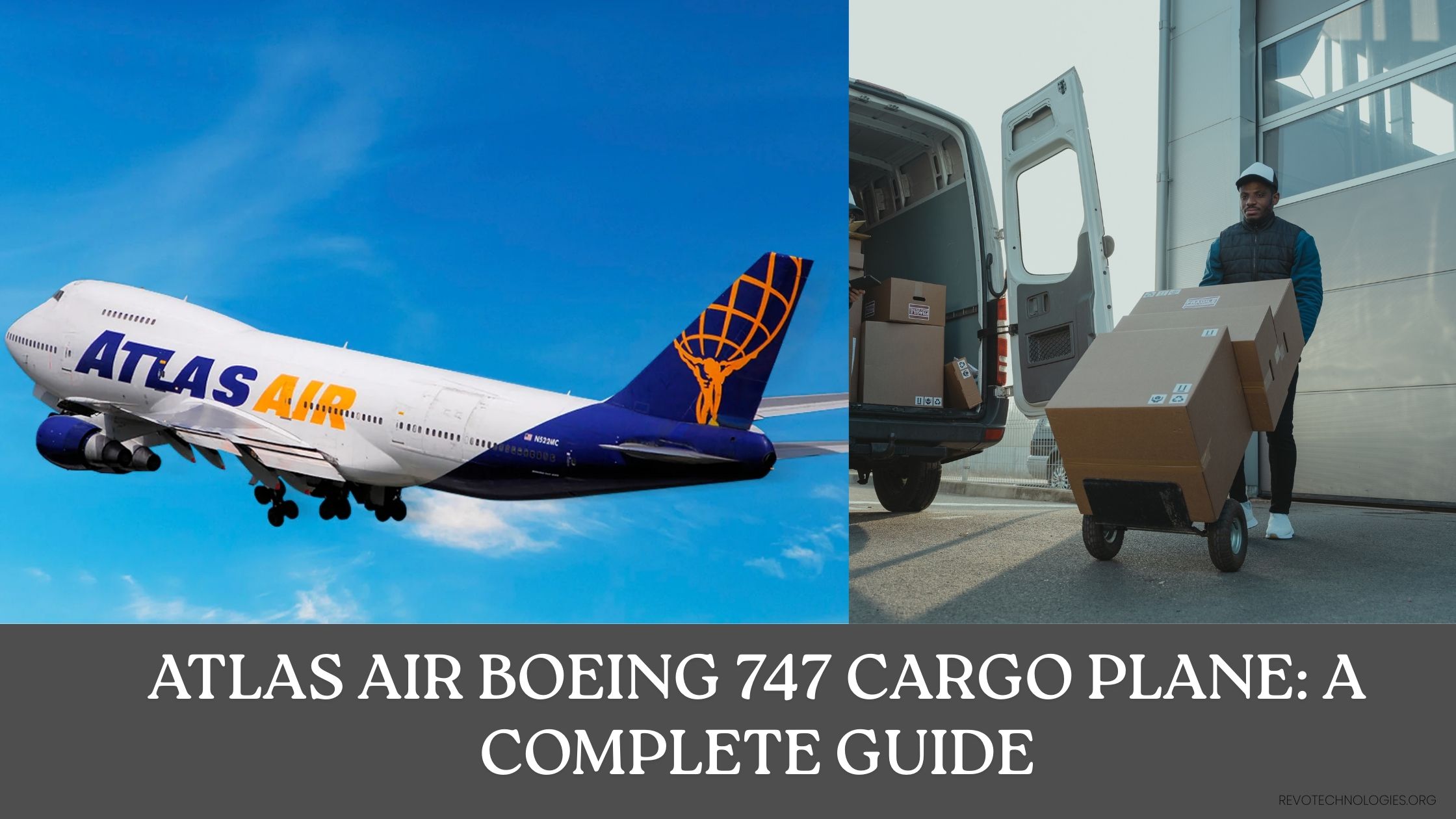The Atlas Air Boeing 747 cargo plane is known for moving goods across continents in a matter of hours. Global logistics relies on this iconic aircraft, also known as the “Queen of the Skies.” What makes it so indispensable? From medical supplies to heavy machinery, how does it transport everything efficiently?
This guide explores the capabilities, uses, and unique benefits of the Boeing 747 cargo fleet, answering your questions while exploring its role in modern freight transportation.
How Does the Atlas Air Boeing 747 Cargo Plane Work?

Atlas Air’s Boeing 747 cargo plane is more than just a freight carrier. It’s a technological marvel. The following are its key features:
1. Advanced Design
- Oversized cargo can be loaded easily with the nose-loading mechanism.
- Weight distribution and storage are made easier with the wide-body fuselage.
2. Powerful Engines
- Four General Electric CF6 engines provide the thrust required to carry up to 137 metric tons.
3. Long Range
- The aircraft can complete long-haul flights without refueling, ensuring timely deliveries.
4. Optimized Cargo Deck
- Maximizes storage capacity with both main deck and lower deck storage.
What Are the Key Features of the Boeing 747 Cargo Plane?
Boeing 747 cargo planes are designed for efficiency and flexibility. The following features stand out:
| Feature | Details |
| Payload Capacity | 137 metric tons |
| Cruising Speed | 920 km/h |
| Loading Mechanism | Nose-loading and side doors for versatility |
| Deck Configurations | Multi-tiered for diverse cargo storage |
| Fuel Efficiency | Optimized for long-haul operations |
Why Is the Boeing 747 Vital for Global Trade?

1. Speed and Efficiency
The Boeing 747 cargo plane delivers speed to global commerce. As a result of its ability to carry large payloads over long distances in record time, it is a preferred choice for industries such as:
- E-commerce
- Pharmaceuticals
- Automotive
2. Versatility
Whether it’s perishable goods or heavy machinery, the Boeing 747 can handle it all. Having the ability to transport a wide range of cargo makes it invaluable to logistics networks.
3. Reliability
A stellar reputation for dependability is owed to the aircraft’s compliance with FAA and ICAO safety standards.
What Sets Atlas Air Apart as an Operator?
In order for Atlas Air to be successful with the Boeing 747 cargo plane, it relies on its operational expertise and client-focused services:
1. Tailored Solutions
Whether it’s live animals or oversized industrial equipment, Atlas Air offers charter flights for unique shipping needs.
2. Advanced Technology
Using real-time tracking systems, clients can monitor their shipments in real time.
3. Specialized Fleet
Among the airline’s 747 variants are the 747-8F, designed for greater fuel efficiency and payload capacity.
How Does the 747 Compare to Other Cargo Aircraft?
| Aircraft Model | Payload Capacity | Range | Unique Feature |
| Boeing 747 | 137 metric tons | 8,000 nautical miles | Nose-loading mechanism |
| Airbus A330 Cargo | 65 metric tons | 4,000 nautical miles | Efficient lower deck storage |
| Antonov An-124 | 150 metric tons | 3,000 nautical miles | Oversized cargo compatibility |
Intercontinental shipping is made possible by the Boeing 747’s unmatched payload capacity and range.
What Challenges Does the Cargo Industry Face?
1. Rising Fuel Costs
Shipping costs are directly affected by fuel prices. By using fuel-efficient aircraft such as the Boeing 747-8F, Atlas Air mitigates this issue.
2. Supply Chain Disruptions
Disruptions can delay shipments regardless of whether they are caused by pandemics or geopolitical issues. Due to Atlas Air’s flexible scheduling and global network, these impacts are minimized.
3. Environmental Concerns
There is pressure on the cargo industry to reduce its carbon footprint. Through advancements in sustainable aviation fuel (SAF), the 747 addresses this issue.
How Does the Boeing 747 Excel at Handling Oversized Cargo?
Its ability to transport oversized items without disassembly is one of the Boeing 747 cargo plane’s most impressive features. Here are some examples:
- Wind turbine blades
- Construction machinery
- Aerospace components
Due to the nose-loading design, logistical challenges are eliminated, ensuring cost-effectiveness and efficiency.
What Role Does the 747 Play in Humanitarian Aid?
The Boeing 747 has proven invaluable during times of crisis:
- Delivers medical supplies and food to areas affected by disasters.
- Assists in evacuation missions by transporting equipment and personnel as quickly as possible.
As a result of its global reach and large capacity, it is a key player in humanitarian efforts.
Visit Revo Tech for more.
How Does Atlas Air Maintain Its Fleet?
1. Rigorous Maintenance
Every Atlas Air aircraft is regularly inspected to ensure it meets FAA standards.
2. Skilled Workforce
The fleet is kept in top condition by a team of experienced technicians.
3. Technological Upgrades
Keeping the fleet competitive and efficient requires upgrades to navigation and fuel systems.
Conclusion: Why the Atlas Air Boeing 747 Cargo Plane Remains Essential
Atlas Air’s Boeing 747 cargo plane is a cornerstone of global trade and logistics. Because of its unique features, such as nose-loading, massive payload capacity, and long range, it is indispensable for industries around the world.
Boeing 747 continues to set the standard for cargo aviation, whether it’s supporting e-commerce growth, facilitating humanitarian missions, or enabling global commerce. With innovations like sustainable fuel and advanced tracking systems, Atlas Air’s iconic aircraft looks as promising as ever in the future.
Frequently Asked Questions
Is the Atlas Air Boeing 747 cargo plane capable of handling hazardous materials?
Boeing 747 cargo planes are fully equipped to handle hazardous materials (HAZMAT) in compliance with international safety regulations. Atlas Air works closely with authorities to ensure that all dangerous goods are properly classified, packaged, and transported safely. Chemicals, radioactive goods, and flammable substances can be transported safely with specialized cargo holds and safety protocols.
Do Boeing 747 cargo planes carry refrigerated or perishable cargo?
The Boeing 747 cargo plane is well-suited for transporting refrigerated and perishable goods. Atlas Air provides temperature-controlled containers that maintain optimal conditions for food, medications, and biological samples. Regardless of the distance or time spent in transit, these specially designed containers ensure that the goods arrive fresh and intact.
Why is the Atlas Air Boeing 747 cargo plane ideal for oversized cargo?
A nose-loading ramp on Atlas Air’s Boeing 747 cargo plane makes it easy to load oversized cargo, such as construction machinery, aircraft parts, and heavy industrial equipment. Due to its design, it is one of the most versatile aircraft for moving large amounts of freight.
How does the Boeing 747 cargo plane improve fuel efficiency?
Boeing 747 cargo planes, especially the 747-8F variant, have improved fuel efficiency. Using advanced aerodynamics and four powerful engines, this long-range freighter significantly reduces the cost per ton of cargo carried. By adopting newer technologies, such as sustainable aviation fuel (SAF), Atlas Air strives to further reduce emissions and operational costs.
On long-haul flights, how does Atlas Air ensure cargo safety?
Atlas Air puts safety at the top of its priorities, and its Boeing 747 cargo planes are outfitted with cutting-edge technology. This includes advanced weather radar systems, enhanced navigation systems, and real-time cargo tracking that monitors the cargo’s condition throughout the flight. Additionally, Atlas Air follows strict FAA and ICAO safety regulations, ensuring all aircraft undergo routine checks and maintenance to ensure cargo and crew safety.







